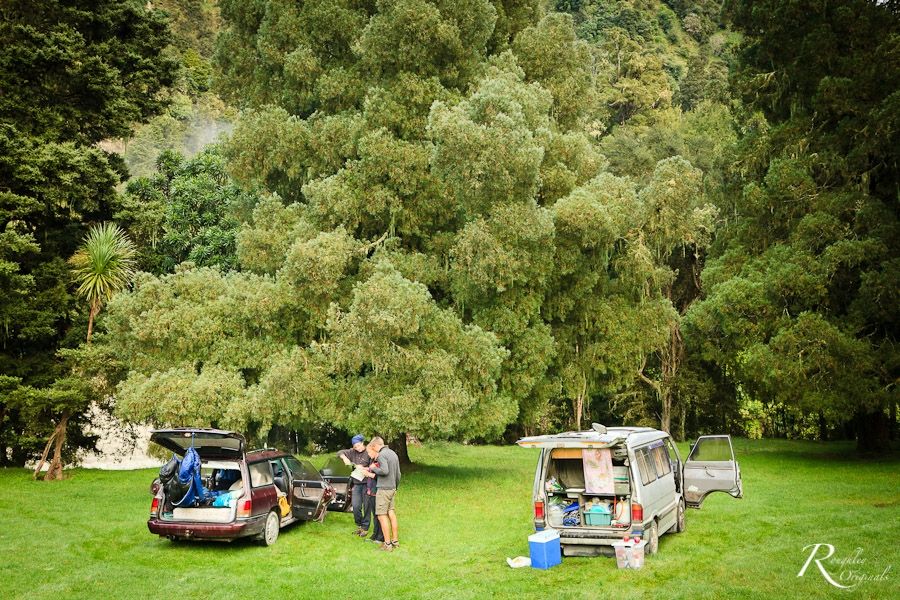Campervan travelling tips from a seasoned expert
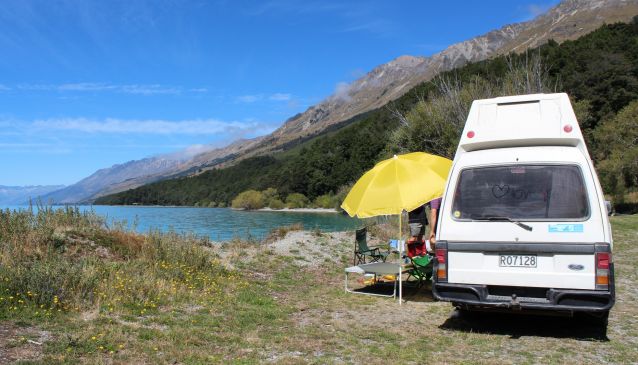 My first ever campervan in New Zealand was a somewhat battered Toyota Hi-ace - essentially just a van with a mattress chucked in the back - chosen purely because it had a rainbow design on its side. This hippy-flavoured paint job perfectly matched the idyllic, road-tripping images I had in my head, fuelled by watching old-school movies in which the living is easy and the road full of non-stop fun and adventure.
Several road trips, vans and years down the line I now know the reality can be very different from such romantic notions. Sometimes living in a tiny 'house' which has to be transport, bedroom, lounge and shelter can be tough. Hollywood never hinted there would be problems with how to keep my food fresh or myself warm in a van which is like an oven or an ice-cave depending on the season; Hollywood never suggested the possibility of sleepless nights spent listening to a mouse scuttling round - an uninvited hitch-hiker eating my food, shredding my toilet paper and proving impossible to evict.
Yes, parts of campervan living are challenging but it is also, for me, the pinnacle of wonderful - the only way to see all the nooks and crannies of this incredible country exactly how I want and according to only one schedule - mine. This is freedom and yes, this is the life.
My first ever campervan in New Zealand was a somewhat battered Toyota Hi-ace - essentially just a van with a mattress chucked in the back - chosen purely because it had a rainbow design on its side. This hippy-flavoured paint job perfectly matched the idyllic, road-tripping images I had in my head, fuelled by watching old-school movies in which the living is easy and the road full of non-stop fun and adventure.
Several road trips, vans and years down the line I now know the reality can be very different from such romantic notions. Sometimes living in a tiny 'house' which has to be transport, bedroom, lounge and shelter can be tough. Hollywood never hinted there would be problems with how to keep my food fresh or myself warm in a van which is like an oven or an ice-cave depending on the season; Hollywood never suggested the possibility of sleepless nights spent listening to a mouse scuttling round - an uninvited hitch-hiker eating my food, shredding my toilet paper and proving impossible to evict.
Yes, parts of campervan living are challenging but it is also, for me, the pinnacle of wonderful - the only way to see all the nooks and crannies of this incredible country exactly how I want and according to only one schedule - mine. This is freedom and yes, this is the life.
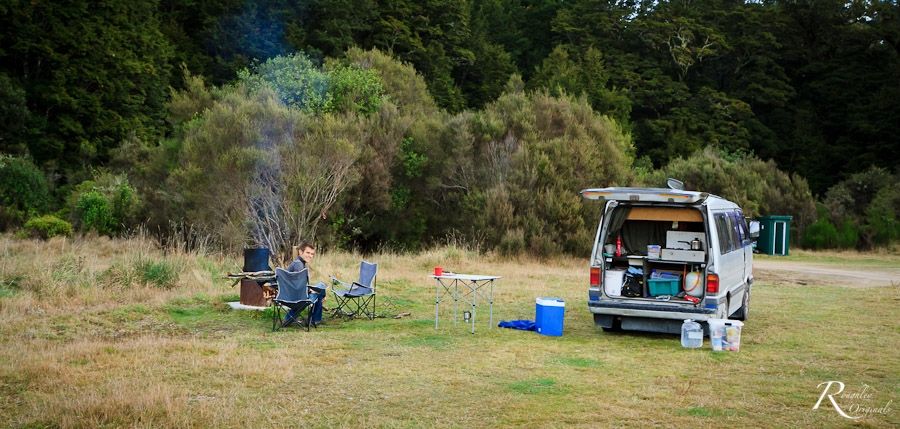
Kaimanawa Forest Park
The Essentials Toilets - Official campsites have toilets of course but I always invest in a 'porta-potty'. This not only serves me in all kinds of emergencies but means I can wild camp. Additionally, being officially 'self-contained' gives me greater camping flexibility, making me eligible for the Gisborne District Council's summer 'Freedom Camp' scheme, for example. The toilet's waste can be emptied at camp-sites or specific dump stations - often marked on road maps. Showers - Campervan living, even without a bathroom, doesn't mean you have to be one of the great unwashed. Although washing in rivers or lakes is a big no-no from an eco-conscious point of view and the typically luke-warm trickle of the solar bag type camp-showers are a waste of time, many towns have shower facilities attached to public toilets. Most of the time though I get by with a bucket of cold water (or boil a billy) and some soap and then occasionally book into a camp-site when the desire for a hot shower becomes overwhelming. Laundry - I do most of my laundry by hand and then every so often book into a campsite or hostel which has laundry facilities to give everything a more thorough wash. The Water Question I had never stopped to think how much water I get through in a typical day while an endless supply was simply the turn of a tap away. Living in a campervan in New Zealand however taught me to carefully plan the use of and cherish every drop of my very limited stores. Once again, if I'm at camp-sites there's no problem but out in the wilds I have to think about it more. Pak 'N' Save and the 'Warehouse' sell bottled water in large, rectangular multi-litre containers with a tap which gives you great reusable water carriers; I buy a couple of these and top up whenever I can. I always carry some kind of water filtration system too as several of my favourite out-of-the-way Department of Conservation camp-sites source their water from a stream. The water may look crystal clear but the most harmful things, such as the giardia parasite nasty, are invisible to the naked eye.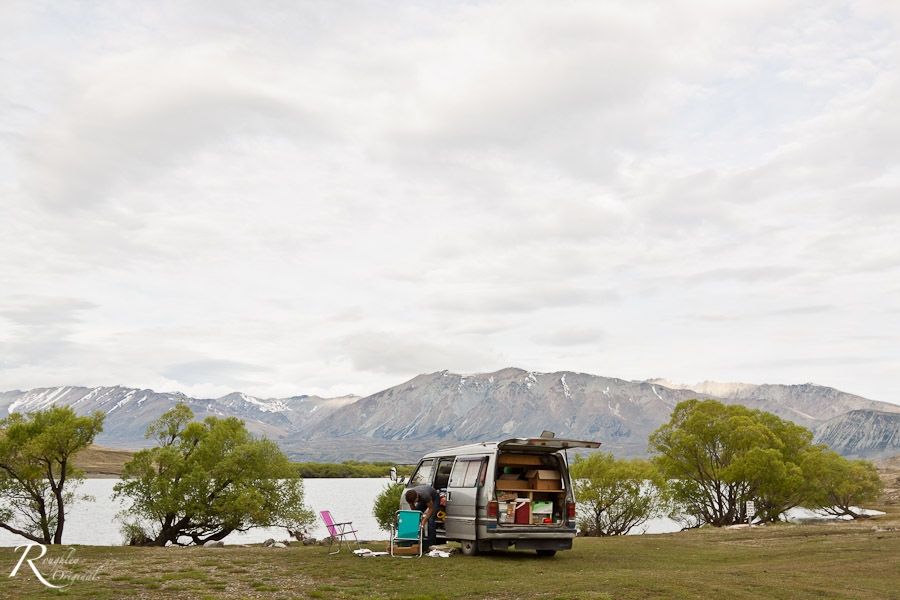
Campground by Lake Mcgregor, Tekapo
The Campsite Question New Zealand has stacks of these in every shape, size and price range from the top-end, every-facility-imaginable, luxury versions right down to nothing more than what is essentially somewhere to park up. I tend to seek out the hidden and the natural while placing low value on facilities, so for me the Department of Conservation (DOC) campsites are ideal. Sometimes free, always budget friendly and invariably in the most beautiful and idyllic of locations, DOC sites are found everywhere. Even in the Auckland area, typically where I set out from, there are a huge number of scenic spots within short driving distance of the metropolitan sprawl. Otherwise, and free of schedules, I tend to follow the 'I-wonder-where-this-little-road-goes' system which is the only way to find some of the hidden away/not-advertised-anywhere gems. My first stop on arrival in any new area....... always the wonderful and omnipresent i-SITEs. These will be your go-to source for hunting down council-run freebies such as the stunning riverside Reid's Farm wild-camp spot just outside of Taupo Roads and Driving The main arteries linking towns and cities are all tarmac but if you want to explore the truly tucked-away and the exceptionally scenic you're going to need to use the non-sealed dirt roads which are very common throughout both islands. Usually slowing down and driving sensibly will be enough but some of these roads are most definitely not for the faint-hearted. Twisting and winding, steep gradients, impossibly narrow, vertiginous drops without barriers and occasionally washed away roads after heavy rain are all possible and you may be called upon to test both driving skills and nerves on occasion. I once had to reverse for more than 1 mile uphill on a single lane, no barrier, crumbling-edged mountain road on the Banks Peninsula, an experience which still had me shaking a couple of hours later. You do get used to it though and what seriously daunted me initially failed to even register after a few weeks. Something which I often failed to factor in to any journeys though, certainly at the beginning, was the driving times. A to B can look very short on the pages of a road map but terrain and road surface may mean a journey far longer than envisaged.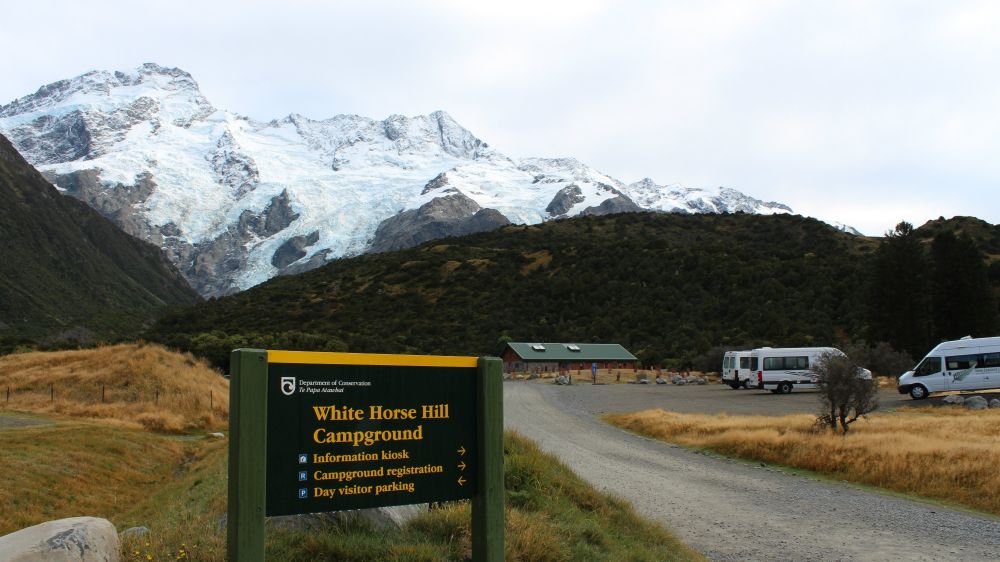
Campground in Mt Cook
Outdoor Living Outdoor living rules when the sun comes out to play but wet weather means campervan living can quickly lose its shine. I always make sure I have a tarp or two which I can rig up to make into waterproof outdoor living spaces. I know from experience when the rain persists what once seemed 'cosy' can quickly turn into 'cramped' and even 'coffin-like' at is extreme. Additionally, I fully accept that too much rain is going to mean a van full of wet clothes and no way to dry them so a stay at a motel or hostel will be inevitable. Otherwise my life will be nasty smells, unpleasantly damp living conditions and eventually mouldy clothes and bedding. It's all about knowing when to admit defeat - even if only for one night. There's one last thing which you should know with regard to living in campervan in New Zealand. The people who call New Zealand home are the most generous, kind, welcoming bunch of folk I have encountered anywhere on the planet. Unless you are thoughtlessly disrespectful or openly ignore signage and restrictions, there is nowhere else on earth so easy and so geared to living in a camper-van. Did I happen to mention........ this IS the life.